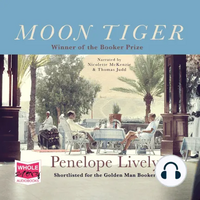You need to sign in or sign up before continuing.
Take a photo of a barcode or cover
I am composed of a myriad Claudias who spin and mix and part like sparks of sunlight on water.
I adored this book with it's multiple points of view (sometimes changing mid paragraph) and dreamy locations and shifting time lines. There are horrible things that happen and there are beautiful things that happen and they all exist in the memory of the main character and she recounts them on her death bed. The writing is incredibly creative and tight and the book is a masterpiece.
I adored this book with it's multiple points of view (sometimes changing mid paragraph) and dreamy locations and shifting time lines. There are horrible things that happen and there are beautiful things that happen and they all exist in the memory of the main character and she recounts them on her death bed. The writing is incredibly creative and tight and the book is a masterpiece.
Wonderful. A life presented in full - the admirable and the despicable - from the character's memory and the memories of the people closest to her.
Ik had hoge verwachtingen van het boek, maar werd nergens meegesleurd en maar zelden geraakt door een scène. Voor mij is dit te geconstrueerd.
Tegenstrijdig genoeg is het hoofdstuk dat mij het meest raakte een van de meest geconstrueerde.
Tegenstrijdig genoeg is het hoofdstuk dat mij het meest raakte een van de meest geconstrueerde.
emotional
reflective
sad
medium-paced
Plot or Character Driven:
Character
Strong character development:
Yes
Loveable characters:
Complicated
Diverse cast of characters:
No
Flaws of characters a main focus:
Yes
This took me a while to get into probably because I was suffering from a book hangover from The Stranger's Child by Alan Hollinghurst. But maybe a quarter of the way through I was hooked. A sad tale of lost love and how even our closest relatives don't know what we're really like. Claudia, the main narrator, and protagonist is difficult to like, but that did make it interesting, and make me question my own responses to the book.
I've been musing on feminism and the prevalence of white supremacism in its most visible structure which no. Nope. Uh-uh. So, what does that leave me in terms of the where-do-we-go-from-here? Strange and terrifying and unthinkable places, judging from conversations both online and off, because if social justice is less realization and more Inception and a much deeper plain is called for than what is sustained by the majority of entertainment both canonical and otherwise, what are we allowed to appreciate?
I have no answers for the average reader of what I write. All I know is this work stayed on my shelves till it resembled [b:The Mandarins|19528|The Mandarins|Simone de Beauvoir|https://d.gr-assets.com/books/1348080972s/19528.jpg|20761] rather than the [b:Sleepless Nights|347413|Sleepless Nights|Elizabeth Hardwick|https://d.gr-assets.com/books/1400441648s/347413.jpg|1045351] I was hoping for. White women going around with their lovers and their daughters and their wars and politics and frustrated dreams, and yes their pain is recognizable but does it have to be worked out on the backs of colonialism-strengthening-tourism and the mournful histories of those whose descendants are pretended extinct by the common pen? Don't get me wrong, white women can help if they really try in the form of [b:The Golden Notebook|24100|The Golden Notebook|Doris Lessing|https://d.gr-assets.com/books/1367457541s/24100.jpg|99441] and [b:Burger's Daughter|526927|Burger's Daughter|Nadine Gordimer|https://d.gr-assets.com/books/1348427341s/526927.jpg|888256], and of course many do not believe the quality of literature relies on how much it can "help", so the choice has ever and always been yours.
The movie based on the main character's book about the history of Moctezuma II and Hernán Cortés smacks of today's Exodus: Gods and Kings, banned in the Egypt that does not come alive in this book beyond slums and walkers on Pyramids and the plot lines of white people dehumanizing everything for their own, what? Centering in the universe? Because let me tell you, it's a sad and lonely existence that believes being on top is worth the sacrifice of taking into serious consideration everything else. Claudia had enough money and beauty and sentimental savior complex to last her to the very end, which is more than can be said for most everyone else. Sure, she held her own in a white male dominated world, but a world beyond European borders does not exist for the sole purpose of personal development.
It's clever and witty and hints at the deeper things, I'll give it that. Ultimately, however, it encourages a hollowness I can no longer afford.
I have no answers for the average reader of what I write. All I know is this work stayed on my shelves till it resembled [b:The Mandarins|19528|The Mandarins|Simone de Beauvoir|https://d.gr-assets.com/books/1348080972s/19528.jpg|20761] rather than the [b:Sleepless Nights|347413|Sleepless Nights|Elizabeth Hardwick|https://d.gr-assets.com/books/1400441648s/347413.jpg|1045351] I was hoping for. White women going around with their lovers and their daughters and their wars and politics and frustrated dreams, and yes their pain is recognizable but does it have to be worked out on the backs of colonialism-strengthening-tourism and the mournful histories of those whose descendants are pretended extinct by the common pen? Don't get me wrong, white women can help if they really try in the form of [b:The Golden Notebook|24100|The Golden Notebook|Doris Lessing|https://d.gr-assets.com/books/1367457541s/24100.jpg|99441] and [b:Burger's Daughter|526927|Burger's Daughter|Nadine Gordimer|https://d.gr-assets.com/books/1348427341s/526927.jpg|888256], and of course many do not believe the quality of literature relies on how much it can "help", so the choice has ever and always been yours.
The movie based on the main character's book about the history of Moctezuma II and Hernán Cortés smacks of today's Exodus: Gods and Kings, banned in the Egypt that does not come alive in this book beyond slums and walkers on Pyramids and the plot lines of white people dehumanizing everything for their own, what? Centering in the universe? Because let me tell you, it's a sad and lonely existence that believes being on top is worth the sacrifice of taking into serious consideration everything else. Claudia had enough money and beauty and sentimental savior complex to last her to the very end, which is more than can be said for most everyone else. Sure, she held her own in a white male dominated world, but a world beyond European borders does not exist for the sole purpose of personal development.
It's clever and witty and hints at the deeper things, I'll give it that. Ultimately, however, it encourages a hollowness I can no longer afford.
An absolutely engaging and compelling short novel.
Moon Tiger manages to be so many things at once: soft/gentle/wistful (in the sense of memory, reminiscence) - witty/wry/sharp (of a clever and strong-willed woman) - complicated/experimental (shifting tenses, echoing repetitions from different perspectives) - and wide in scope (from England to Egypt, and afar into history, and deep into personal narrative).
I read this after Hawksmoor and found many similarities, in the ways both books explore the voice of history and the public and private natures of "the collective past". However (to vastly oversimplify, while saying something that feels very true) Hawksmoor is a story of male energy in a man's world and Moon Tiger is the story of a woman, of that same world, being utterly herself.
Moon Tiger manages to be so many things at once: soft/gentle/wistful (in the sense of memory, reminiscence) - witty/wry/sharp (of a clever and strong-willed woman) - complicated/experimental (shifting tenses, echoing repetitions from different perspectives) - and wide in scope (from England to Egypt, and afar into history, and deep into personal narrative).
I read this after Hawksmoor and found many similarities, in the ways both books explore the voice of history and the public and private natures of "the collective past". However (to vastly oversimplify, while saying something that feels very true) Hawksmoor is a story of male energy in a man's world and Moon Tiger is the story of a woman, of that same world, being utterly herself.
This is well written, but I never really connected with it. The mechanics of the book (not just the slippery narration but also the nonchronological skipping through ALL OF TIME) overshadowed the story for me. The main character is distant and detached, and that had its effect.
I’ve not read much by this author, if any, but this book was lovingly mentioned several times in Dear Reader by Cathy Rentzenbrink so I wanted to find out what made her so passionate. It’s a very moving book, and the deteriorating condition of the narrator does make the changing timelines more understandable. I’m not sure it’s one I’ll return to, but I did appreciate the perspective on the war, the classical references and its honesty.






